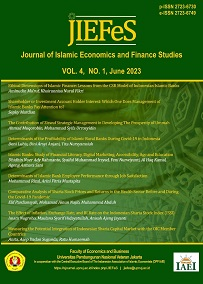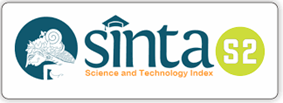The Contribution of Zakat, Infaq, Sadaqa, and Waqf (Ziswaf) Strategic Management in Developing the Prosperity of Ummah
DOI:
https://doi.org/10.47700/jiefes.v4i1.5698Keywords:
Social Institution, Strategic Management, Ummah, Welfare, ZiswafAbstract
As a country with the largest muslim population in the world, Indonesia is still far behind in developing the potential of zakat, infaq, sadaqa, and waqf (ziswaf) which should be optimized. This requires a mature strategy in managing to maximize the potential of ziswaf. This study aims to examine the development of ziswaf strategic management at the Baitul Al-Qur'an Social Fund Institution (LDSBQ) which has a vision and mission based on Islamic sharia and aims to prosper the Ummah. This research uses a qualitative approach with a descriptive analysis method, while the data collection instruments use interviews, observation, and documentation. Sources were taken from various references related to the topic of the problem, namely journals, books, and other articles. The results showed that the three main programs of LDSBQ are First, scholar smile; engaged in education. Second, smile healthy; is engaged in the health sector. Third, independence smile; which is a movement for community independence in the economic field, and is supported by social-religious activities such as waqf and da'wah programs. While the fundraising strategy uses a potential network of student and teacher guardians, a network of Gontor alumni colleagues, program socialization through social media, online and offline donation services, and program-based waqf. With a real sector-based movement, social community activities can have a significant impact on the welfare of the ummah to gain happiness in this world and the hereafter.
References
Aedy, H. (2011). Teori dan Aplikasi Ekonomi Pembangunan Perspektif Islam Sebuah Studi Komparasi. Graha Ilmu.
Ahmad, Z. (1991). Islam, Kemiskinan dan Distribusi Pendapatan. The Islamic Foundation.
Akhtar, Z. (2013). Charitable Trust and Waqfs: Their Parallels, Registration Process and Tax Reliefs in United Kingdom. Statute Law Review, 34(3), 281–295. https://doi.org/https://doi.org/10.1093/slr/hms045
Al-ghazali, A. hamid. (1991). Al Mustashfa min Ilmi Al Ushul (2nd ed.). Universitas Islam madinah.
Al-Jazaari, A. B. J. (1976). Minhajul Muslim. Dar al-Fikr.
al-Qardhawy, Y. (1993). Al-Ibadah fil Islam. Muassasah Risalah.
Amirudin, Choirul & Sabiq, A. F. (2021). Peran ZISWAF Dalam Memulihkan Ekonomi Ummat Akibat Masa Pandemi Covid-19. Jurnal Baabu Al-Ilmi: Ekonomi Dan Perbankan Syariah, 6(1). https://doi.org/http://dx.doi.org/10.29300/ba.v6i1.4074
Andika, Aldi, & A. (2020). Optimisasi Potensi ZISWAF jadi Solusi Penanganan Covid-19. Komite Nasional Ekonomi Dan Keuangan Syariah. https://knks.go.id/berita/301/optimalisasi-potensi-ziswaf-jadi-solution-handling-covid-19 ?category=1
Anwar, Y. & A. (2013). Sosiologi untuk Universitas. Refika Aditama.
Ascarya, A. U. S. J. A. H. (2022). Proposed model of integrated Islamic commercial and social finance for Islamic bank in Indonesia. Eurasian Economic Review, 1(12).
Baharudin, A. (2022). Interview With Director Baitul Al-Quran Social Fund Institution.
Bariyah, N. O. N. (2016). Strategi Penghimpunan Dana Sosial Ummat Pada Lembaga-lembaga Fillantrofi di Indonesia (Studi Kasus Dompet Peduli Ummat Daarut Tauhid, Dompet Dhuafa Republika, BAZNAS dan BAZIS di DKI Jakarta). Li Falah: Jurnal Studi Ekonomi Dan Bisnis Islam, 1(1), 22–34. https://doi.org/http://dx.doi.org/10.31332/lifalah.v1i1.472
Basrawi & Suswandi. (2008). Memahami Penelitian Kualitatif. Rineka Cipta.
Brochure. (2022). Baitul Al-Quran Social Fund Institution Brochure.
Cahyo, Eko Nur & Muqorobin, A. (2019). Strategi Pengembangan Wakaf Berkelanjutan dalam Sektor Pertanian: Studi Kasus di Yayasan Pemeliharaan dan Perluasan Wakaf Pondok Modern (YPPWPM) Gontor Ponorogo. Falah: Jurnal Ekonomi Syariah, 4(2). https://doi.org/https://doi.org/10.22219/jes.v4i2.10086
Chapra, U. (1995). Islam and The Economic challenge. IIIT.
Fahrudin, A. (2014). Pengantar Kesejahteraan Sosial. PT. Refika Aditama.
Ghony, M. Djunaidi & Almanshur, F. (2014). Metode Penelitian Kualitatif. Ar-ruzz Media.
Hakim, Miftahur Rahman, Susanti, Leni and Kholidah, N. (2019). Ziswaf Collection Strategy on LAZISMU X, Indonesia. , 1st Borobudur International Symposium on Humanities, Economics and Social Sciences (BIS-HESS 2019), Advances in Social Science, Education and Humanities Research, 436.
Handayani, Kartika , Nurmalasari, Anna, & L. (2020). Sistem Informasi Pengelolaan ZISWAF (Zakat Infaq, Sedekah and Wakaf) Berbasis Web. Jurnal Khatulistiwa Informatika, 8(2). https://doi.org/https://doi.org/10.31294/jki.v8i2.9174
Hasanah, A. (2019). Potensi Jatim Dana Zakat Sebesar IDR 213 Trillion. RRI Net. https://rri.co.id/daerah/669149/potensi-dana-zakat-jatim-sebesar-rp-213-triliun
Hermawan, Dhany & Waluya, A. H. (2019). Peran ZISWAF dalam Pemberdayaan Masyarakat Miskin di Provinsi Banten (Studi Kasus Program Hibah Rumah Siap Huni Koperasi Syariah Benteng Mikro Indonesia). Al-Infaq: Jurnal Ekonomi Islam, 10(1). https://doi.org/https://doi.org/10.32507/ajei.v10i1.478
Hidayah, R. N. (2017). Strategi Dompet Dhuafa Sumatera Selatan dalam Menarik Minat Donatur untuk Menyalurkan Dana Zakat Infak Sadaqah Wakaf (ZISWAF). Intelektualita, 6(1), 135–144. https://doi.org/https://doi.org/10.19109/intelektualita.v6i1.1305
Hidayati, Athi’, Chamim, M. Huda, Sokhi,, Haryanti, P. (2020). Peta Distribusi Zakat, Infaq and Sedekah (Studi Development Pada BAZNAS Kabupaten Jombang). ZISWAF: Jurnal Zakat Dan Wakaf, 7(1).
Humas BAZNAS. (2021). Pengumpulan BAZNAS Pusat 2021 Tumbuh 33 Persen. Badan Amil Zakat Nasional. https://baznas.go.id/Press_Release/baca/Pengumpulan_BAZNAS_Pusat_2021_Tumbuh_33_Persen/950
Ishandawi, D. K. (2023). Ziswaf Fund Management Development Strategy in Islamic Banking. Proceeding Medan International Conference Economics and Business, 1.
Islamy, Robithoh Alam & Hannase, M. (2021). Optimizing The Role of Zakat and Wakaf in Promoting National Economic Growth: Analytic Network Process (ANP) Method Approach. Journal of Islamic Economic Laws, 4(1). https://doi.org/10.23917/jisel.v4i1.13093
Iswandi, A. (2021). Peran Lembaga ZISWAF Dalam Distribusi Ekonomi Pada Masa Pandemi Covid-19. Al Tasyree: Jurnal Bisnis,Keuangan Dan Ekonomi Syariah, 1(2).
Jaenudin, M. and A. H. (2022). The Impact Assessment of Zakat, Infaq, Shadaqah on Spiritual and Material Poverty in Beneficiaries of LMI Zakat Institution: The CIBEST Approach. Jurnal Ekonomi Syariah Teori Dan Terapan, 9(3).
Juwaini, A. (2005). Panduan Direct Mail Untuk Fundrising. Piramedia.
Kahf, M. (1999). The principle of socio-economic justice in the contemporary Fiqh of Zakah. IQTISAD Journal of Islamic Economics.
Kasri, R. (2013). Giving behaviors in Indonesia: Motives and marketing implications for Islamic charities. Journal of Islamic Marketing, 4(3).
Khasanah, U. (2010). Manajemen Zakat Modern. UIN Maliki Press.
Kontjaraningrat. (1996). Pengantar Antropologi I. Rineka Cipta.
Kusriyah, S. (2022). The Principles of the Welfare Law State in an Islamic Perspective. Jurnal Daulat Hukum, 5(4).
Lubis, Rusdi Hamka & Latifah, F. N. (2019). Analisis Strategi Pengembangan Zakat, Infaq, Shadaqoh dan Wakaf di Indonesia. Perisai: Islamic Banking and Finance Journal, 3(1). https://doi.org/https://doi.org/10.21070/perisai.v3i1.1999
Mahfudz, S. (1994). Nuansa Fiqh Sosial. LKiS.
Miyasto, M. D. M. T. A. R. M. (2019). Welfare in Islamic Perspective and the Affecting Factors. International Journal of Management Sciences and Business Research, 8(8).
Muqorobin & Cahyo, A. E. N. (2019). Parameter Pengembangan Produk-Produk Perbankan Syariah Dengan Pendekatan Maqasid Syariah (Studi Kasus di Perbankan Syariah Kota Ponorogo). Islamic Economics Journal, 5(2).
Mursal, M. R. F. S. A. L. T. N., & Alamc, and L. (2021). The contribution of Amil Zakat, Infaq and Shadaqah Muhammadiyah (LAZISMU) institutions in handling the impact of Covid-19. Journal of Sustainable Finance & Investment.
Muslim, A. al-H. al-Q. al-N. (1983). Sahih Muslim. Dar Ihyā al-Turāts al-‘Arabi.
Owoyemi, M. Y. (2020). Zakat management: The crisis of confidence in zakat agencies and the legality of giving zakat directly to the poor. Journal of Islamic Accounting and Business Research, 11(2).
Pati, U. K. P. P. (2021). Sharia Fintech as a Sharia Compliance Solution in the Optimization of Electronic-Based Mosque’s Ziswaf Management. Padjajaran Journal of Law, 8(1).
Pohan, I. S. (2007). Jaminan Mutu Layanan Kesehatan: Dasar-dasar Pengertian dan Penerapan. EGG.
Putra, B. J. M. S. N. Y. T. L. L. D. (2023). Development of The Economic Sector Through Zakat Funds by LAZISMU: AHP Approach. OPTIMUM: Journal of Economics and Development, 13(1). https://doi.org/https://dx.doi.org/10.12928/optimum.v13i1.6826
Rahman, R. M. (2020). Optimalisasi ZISWAF Sebagai Alternatif Solusi Ketahanan Pangan di Masa Krisis. Kasaba: Jurnal Ekonomi Islam, 13(2). https://doi.org/http://dx.doi.org/10.32832/kasaba.v13i2.3664
Roziq, A. Y. N. C. Y. (2022). Model of Productive Islamic Social Fund Management for Poor Empowerment. International Journal of Professional Business Review, 7(5). https://doi.org/https://doi.org/10.26668/businessreview/2022.v7i5.e597
Sani, M. A. (2010). Jurus Menghimpun Fulus, Manajemen Zakat Berbasis Masjid. Gramedia Pustaka Utama.
Sodiq, A. (2015). Konsep Kesejahteraan Dalam Islam. Equilibrium, 3(2).
Syamsuri, bin Lahuri, Setiawan, Bakri, Wahyudi , Fatoni, Anwar, Wibowo, H. S. (2021). Strategy for Improving the Quality of Waqf Institution Through Good Waqf Governance. Al-Iktisab: Journal of Islamic Economic Law, 5(1). https://doi.org/http://dx.doi.org/10.21111/al-iktisab.v5i1.6200
Zahro, F. andTika W. (2022). The Role of ZISWAF Funds in Developing The Quality of Education (Case Study: Griya Khadijah). Jurnal Ekonomi Syariah Teori Dan Terapan, 9(4).
Zakiyuddin, B. (2015). Lazismu and Remaking the Muhammadiyah’s New Way of Philanthropy. Al- Jāmi‘ah: Journal of Islamic Studies, 53(2). https://doi.org/https://doi.org/10.14421/ajis.2015.532.387-412
Zuhayly, W. (1995). Zakat Kajian Berbagai Madzhab. Rosda Karya Youth.
Zumrotun, S. (2016). Peluang, Tantangan dan Strategi Zakat Dalam Pemberdayaan Ummat. Jurnal Hukuim Islam, 14(1), 97–104. https://doi.org/https://doi.org/10.28918/jhi.v0i0.669
Downloads
Published
Issue
Section
License
Copyright (c) 2023 Ahmad Muqorobin, Mohammad Syifa Urrosyidin

This work is licensed under a Creative Commons Attribution 4.0 International License.
Authors who publish with this journal agree to the following terms:
- Authors retain copyright and grant the journal right of first publication with the work simultaneously licensed under a Creative Commons Attribution 4.0 International License that allows others to share the work with an acknowledgment of the work's authorship and initial publication in this journal.
- Authors can enter into separate, additional contractual arrangements for the non-exclusive distribution of the journal's published version of the work (e.g., post it to an institutional repository or publish it in a book), with an acknowledgment of its initial publication in this journal.
- Authors are permitted and encouraged to post their work online (e.g., in institutional repositories or on their website) before and during the submission process, as it can lead to productive exchanges, as well as earlier and greater citation of published work.

This work is licensed under a Creative Commons Attribution 4.0 International License.











